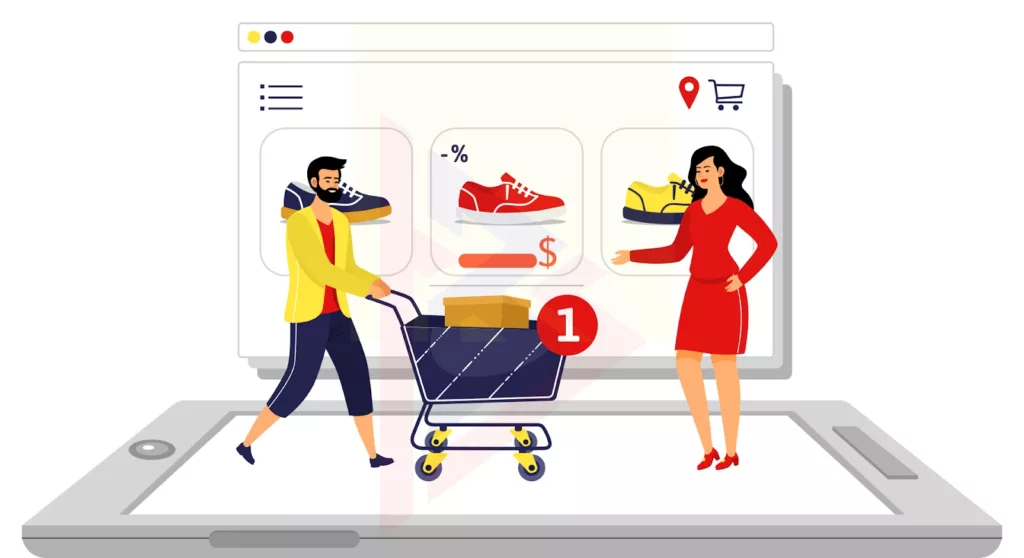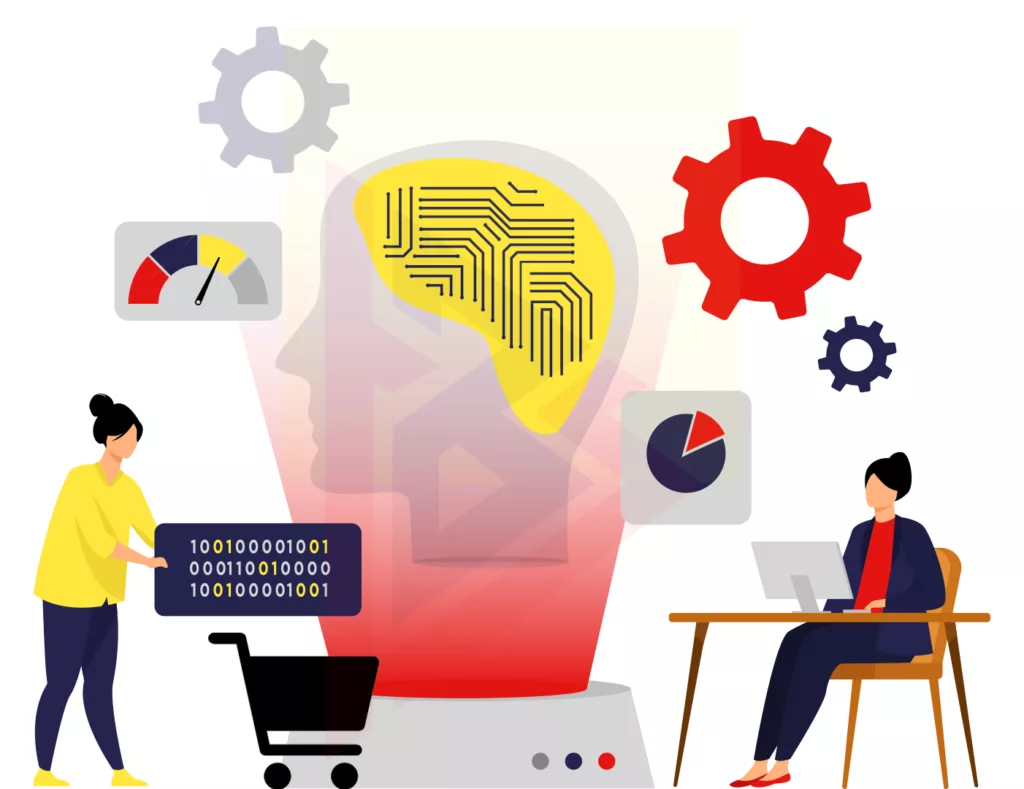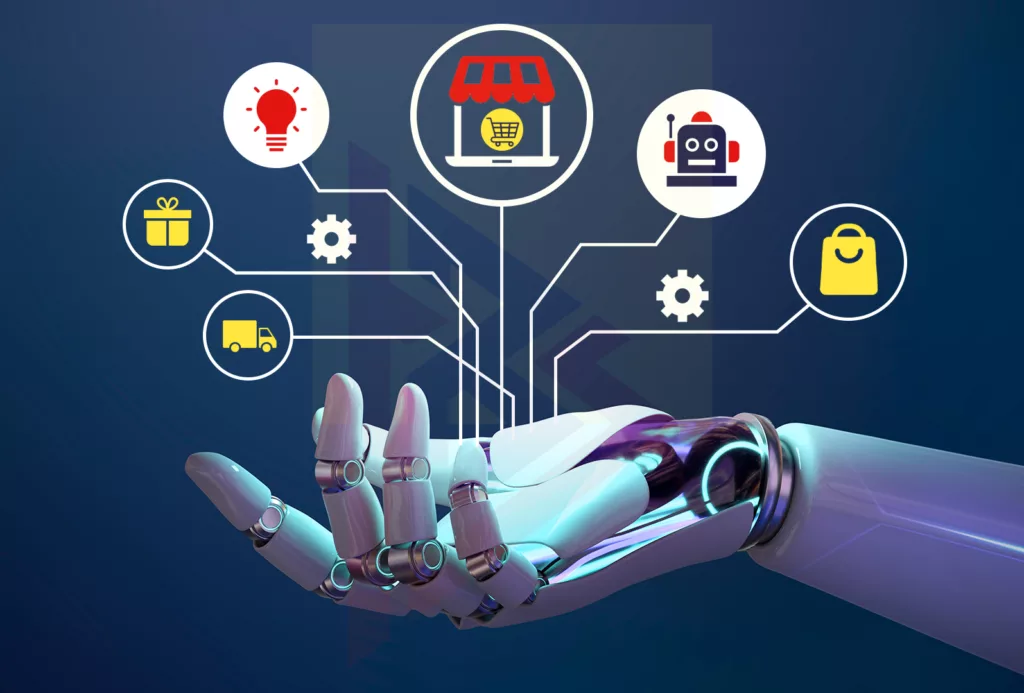Unless you’ve been living in a cave for the last few years, you’ve almost certainly heard of artificial intelligence (AI). However, AI is Revolutionizing Ecommerce Trends, now let’s find out.
In this article, we’ll discuss some of the most effective and practical ways. And that retail organizations are utilizing artificial intelligence in the world of online shopping.
AI is beginning to pervade many facets of our existence. Artificial intelligence is almost omnipresent, from the expanding number of self-checkout cash registers to improved security checks at airports.
It is, widely expected that AI will accelerate in the next years. Companies such as Google and Microsoft already spending considerably on new AI programs.
Google’s recent £400 million acquisition of start-up DeepMind. An artificial intelligence startup specializing in algorithms and machine learning for social good is just one of several anticipated purchases as the promise of such technology becomes a reality.
Other large technology companies, such as Facebook, IBM, and Yahoo, have already openly stated their commitment to creating artificial intelligence as a new revenue stream.
If you conduct an online search for artificial intelligence. You will come across hundreds of publications forecasting a market dominated by the application of artificial intelligence.
Indeed, a recent Business Insider analysis indicates that by 2020, up to 85 percent of consumer transactions would be, handled without human intervention.
Numerous eCommerce organizations are already utilizing kinds of artificial intelligence to gain a better understanding of their clients. And create new leads, and improve the customer experience.
AI Revolutionizing E-commerce: An Exhaustive List
1. Develop Customer-Centric Search
Amir Konigsberg now serves as the CEO of Twiggle, a company that enables e-commerce search algorithms to think like humans. Amir has stated in recent interviews that consumers frequently abandon eCommerce experiences because the product results given are frequently irrelevant.
To address this issue, Twiggle leverages natural language processing to help online buyers restrict, contextualize, and eventually improve their search results.
Clarifai, a US-based technology start-up, is another company attempting to improve e-commerce search. Clarifai’s early work concentrated on the visual aspects of search, and the program is, described on the company’s website as ‘artificial intelligence with a vision.’
Through powerful image and video recognition, the company lets developers create smarter apps that are the world as you do.’ This enables businesses to produce a customer-centric experience.
By utilizing machine learning, the AI program tags organizes, and visually searches content by categorizing picture or video attributes.
Read more about their Custom Training. This enables you to create bespoke models for teaching AI to comprehend any concept. Whether it’s a logo, product, style, or Pokemon.
You can then browse or search for media assets using keyword tags or visuals. Similarities using these new models in conjunction with current pre-built models (e.g. general, color, food, wedding, travel, etc.).
AI technology provides a competitive advantage to enterprises and is accessible to developers and businesses of any size or budget. A fantastic example is Pinterest’s new upgrade to its Chrome plugin, which lets users select an object in any online snapshot and then request that Pinterest surface comparable products via image recognition algorithms.

Not just Pinterest is utilizing AI to create new search experiences.
Shoppers are, progressively abandoning impulse control as revolutionary visual search tools are, added to the software platforms that power eCommerce websites.
Along with identifying complementary products, AI enables shoppers to discover complementary items based on their size, color, shape, fabric, or even brand. Such software actually excels in terms of graphic qualities.
The software can successfully aid the consumer in locating the goods they desire by first gathering visual signals from the submitted imagery. The consumer no longer needs to be shopping in order to see an item they wish to purchase.
For instance, kids might take a shine to a friend’s new clothing or a coworker’s new pair of Nike sports shoes. If there is a visual, AI enables shoppers to readily identify comparable things on e-commerce sites.
2. Target potential customers again.

According to Conversica, sales teams do not follow up on at least 33% of marketing leads. This means that pre-qualified prospects interested in your product or service will inevitably fall through the cracks.
Additionally, many firms are, swamped with unmanageable consumer data that they use sparingly or not at all. This is a veritable trove of intelligence that may be, leveraged to optimize the sales cycle.
For example, a closer examination of the retail business reveals that facial recognition is already being, utilized to apprehend shoplifters through the deployment of CCTV cameras to scan their faces.
However, how might artificial intelligence be, applied to improve a customer’s purchasing experience?
To that end, several firms are now utilizing facial recognition to track client dwell durations in-store.
This means that if a consumer spends an extended, period of time near a certain product, such as an iPod, this information will be, saved for use on their subsequent visit.
We anticipate customized offers on customers’ computer screens based on their in-store stay time as artificial intelligence advances. In other words, omnichannel businesses are making strides in terms of remarketing to customers.
The face of sales is evolving, as organizations increasingly respond directly to their customers. It’s as if corporations can read their consumers’ minds, and it’s all due to the data combined with AI.
Read more on how Golang is effective for AI.
3. Predictive churn and intelligent consumer engagement

Additionally, machine-learning algorithms can assist in identifying disengaged consumer segments that are on the verge of churning or defecting to a rival.
This category of AI-powered solutions can assist in gathering data, developing a prediction model, and testing and validating the model on real clients. This information can be, used to determine which stage of churning the individual is in. While quick-churn customers (those who abandon a product shortly after starting to use it) are, notoriously tough to re-engage, late-churn customers (those who have a long-standing relationship with your brand) can be, enticed to continue using it.
When used in conjunction with targeted content production, AI-powered churn prediction helps you retain more of your clients, resulting in increased lifetime value and revenues. Because churn prediction is, unique to each product and organization, the machine-learning algorithms must be, customized or constructed from scratch for your business. Utilizing this data, you may design more effective content for disengaged users.
Read here about the approximate cost of the development of a mobile app.
4. Improve The Efficiency Of The Sales Process

Thankfully, almost all of us have progressed past the days of relying on trusted Yellow Pages and cold-calling new prospects.
Customers’ lives are, now significantly influenced by a range of different media outlets, ranging from television advertisements to social media. Indeed, Snapchat has proven itself as a legitimate sales and marketing tool in the last year, creating new chances.
If you want to adapt your problem-solving solutions and build a compelling sales message that reaches consumers on the right platform at the right time, integrating AI into your CRM is the way to go.
Numerous AI systems, such as Siri or Alexa, support natural language learning and voice input. This enables a CRM system to effectively respond to client inquiries, resolve customer issues, and even find new sales prospects for the sales staff. Certain AI-driven CRM systems are even capable of multitasking in order to manage all of these functions and more.
The North Face, a prominent eCommerce shop, is an excellent example of a corporation raising its game through the use of AI to gain a deeper understanding of its customers. They enable online shoppers to discover their perfect jacket by utilizing IBM’s Watson artificial intelligence solution.
They accomplish this by posing questions to the customer via voice input AI technology, such as “Where and when will you be wearing your jacket?” IBM’s software then scans hundreds of products to identify ideal matches based on real-time customer input and internal research, such as local weather conditions.
There is little doubt that AI is already affecting e-commerce and has begun to evolve sales processes in response to new data. The modifications will ensure that clients are, no longer given improper products or services.
AI is transforming the way businesses interact with their consumers, enabling firms to obtain faster access to information and better utilize their employees’ abilities.
5. Personalise multiple devices in a new way.

Personalization is nothing new in eCommerce, and anyone who uses Amazon on a regular basis would understand what we’re talking about. However, as artificial intelligence and machine learning technologies continue to progress, new levels of personalization have begun to enter the rapidly rising world of e-commerce.
Whereas customization powered by AI for eCommerce takes a multi-channel strategy. New artificial intelligence engines, such as Boomtrain, sit on top of many client touch points, assisting businesses in analyzing how customers engage online.
Whether it’s a mobile application, a website, or an email campaign, the AI engine monitors all devices and channels in real-time to provide a single view of the customer. This consolidated view of the customer helps eCommerce companies to provide a consistent customer experience across all platforms.
When a consumer is exploring iPhone covers on your website, they may receive a push message on their mobile device telling them about your iPhone case flash sale. They complete the transaction straight on their phone, which eliminates numerous processes for both sides.
Read here, why your next app should be developed in Flutter.
6. Make chatbots more personal.

Consumer expectations have shifted as a result of a cyclone of technology advancements, and commerce is, increasingly centered on creating experiences for the individual, rather than the mass market. For consumers, a plethora of contact points and influences contribute to buying decisions.
Numerous eCommerce businesses are, already growing more sophisticated in their use of artificial intelligence to capture customer attention, and one strategy that is, gaining traction is, dubbed ‘conversational commerce.’
This is the convergence of visual, audible, textual, and predictive skills in the eCommerce sector. Consumer preferences are changing at a breakneck pace, to the point where businesses are struggling to keep up.
If brands are, to survive, this is a critical business strategy that must be, implemented. The deployment of artificial intelligence via ‘chatbots’ is just one method for driving the conversation in this new era of conversational business.
What, then, is a chatbot?
By definition, a chatbot is a special type of computer program that is, used to simulate human-to-human communication over the Internet.
Chatbots can actively assume some of the critical responsibilities associated with running an online business, most notably when it comes to conducting operations and marketing chores.
Chatbots can automate order procedures and provide customer support in an efficient and cost-effective manner. Social customer service is beginning to establish itself as a must, rather than an option.
When customers browse the web, they are, frequently already hooked to social media platforms such as Facebook. Keeping this in mind, there is an excellent chance to leverage messenger capability to confirm orders or provide immediate online support.
Additionally, a chatbot system can be, integrated with a shopping cart.
Once the chatbot system is, merged with one of your shopping carts, it can be, used with any of the platform’s stores. The more shopping carts your chatbot program provides, the greater the number of potential customers.
Additionally, certain systems require shopping cart connectivity in order to gather information about products, quantities, and shipping terms that chatbots can use to offer appropriate responses to customers.
For eCommerce retailers, chatbots offer a valuable customer assistance solution. As previously stated, various viable options exist, including contact forms, phone calls, and email. Online chat, on the other hand, remains the quickest and, in many situations, the most comfortable method for visitors to obtain answers.
So, do you want to know the difference between React Native and Ionic, click here to read our blog.
7. Provide workers with empowerment.

While online businesses have experimented with chatbots, they have also considered ways to duplicate the helpful in-store experience.
Lowe’s, a home improvement retailer, is an excellent example of this type of execution. Lowe debuted the LoweBot, the company’s first autonomous robot, in late 2014.
The towering shopping assistant meets visitors at the door. Directs them throughout the store, gathers pertinent product information, and even supports personnel with inventory management.
8. Utilize virtual assistants.
This enables Lowe’s experienced store employees to focus on more meaningful interactions with customers

At times, we all require a little assistance online.
After all, what use do cloud-based artificial intelligence software agents serve?
We’re all familiar with the typical suspects. Such as Siri, Google Now, and Alexa, who introduced us to the concept of conversing with a phone, laptop, or even a home appliance.
However, many of these virtual assistants have devolved into mundane commodities for the user in recent months, with few relevant updates.
Virtual assistant advancements are based on breakthroughs in natural language processing. And the machine’s capacity to interpret what people say in words or text.
What does this mean for online merchants?
Consider Amazon’s virtual assistant, Alexa.
Their virtual assistant, which has, recently established itself as one of commerce’s most prominent voices, has been, successfully integrated into both Amazon’s own goods and those of third-party manufacturers.
For example, clients can use Alexa on an Amazon Echo device to identify local gigs for the upcoming weekend. And also arrange transportation to and from the event via Uber, and even purchase pre-event food from Domino’s (and track the order status in real-time).
In the United States, the rapidly growing 1-800-Flowers allows clients to send flowers to their loved ones through voice.
Virtual assistants are changing the way people shop and present an innovative potential for eCommerce retailers.
9. Adapt to everyday household items.

Few examples of AI integration are more intriguing than the collaboration between Amazon’s Alexa and LG’s Smart InstaView refrigerators.
LG has experimented with prior versions of the InstaView refrigerator that included massive touchscreens integrated into the door. LG has, however, included a virtual assistant and webOS software this time around. It’s an area where a virtual assistant could be extremely beneficial.
Along with news and weather updates, it can assist you with your shopping orders. You’ll never need to run to the store again for milk. Consider the opportunities for eCommerce sellers who have direct access to consumers’ homes.
10. Provide Better Recommendations To Customers

Through the use of artificial intelligence, brands can more intelligently and efficiently scan petabytes of data in order to forecast customer behavior and make relevant and helpful recommendations to specific consumers.
This kind of knowledge is critical for providing consumers with a personalized purchasing experience.
Starbucks has been, significantly involved in this process, leveraging AI to analyze all of its user data and provide more personalized recommendations.
For example, Starbucks just debuted ‘My Starbucks Barista,’ a service that leverages artificial intelligence to enable users to place orders via voice command or messaging.
The algorithm takes a range of inputs into account, such as customer preferences, purchase history, third-party data, and contextual information.
This enables the coffee behemoth to design and send more customized messages and recommendations to its customers.
eCommerce, a dynamic sector, has altered the way consumers shop in today’s mobile environment. Numerous eCommerce organizations strive to replicate the greatest aspects of an offline shopping experience online, by providing clients with a smooth approach to discovering things they are actively seeking.
There is a strong emphasis on ‘hyper-personalization,’ which can only be, accomplished through the study of genuine consumer behavior and the forecast of future behavior using massive amounts of data acquired from user actions on smartphones, tablets, and PCs.
The recommendation is a widely used technique by eCommerce merchants to assist customers in locating the best option.
For instance, Amazon recommends products to consumers based on their activity on the site and any previous purchases.
Netflix recommends television shows and movies depending on a user’s involvement with categories such as drama, comedy, and action.
While eBay manually collects user feedback on products in order to recommend them to customers who demonstrate similar patterns.
And this continues to evolve as a result of the numerous permutations and combinations. AI is already being, used to provide subscribers with personalized recommendations based on their tastes, and we expect this to grow rapidly over the next year.
11. Introducing Virtual personal shoppers.

While we addressed virtual assistants in #8, AI is also helping marketers to develop purpose-built shoppers’ to aid their online customers.
Both brands and customers appreciate the numerous benefits of in-store shopping. For instance, the customer can speak directly with a shop clerk.
They may inquire about a certain item in a specific color or size. These benefits are, limited online due to the time-consuming (and perhaps frustrating) process of ticking boxes or entering keywords.
With this in mind, eCommerce businesses must develop novel ways to convey the benefits of the offline experience online.
Flipkart, an Indian e-commerce company, has already undertaken attempts to emulate human intelligence in order to sell more intelligently to its more than 45 million registered online buyers.
Indeed, the company established Ping, a messaging service. Ping operated as a shopping assistant until it was, shut down in 2016. The service incorporated artificial intelligence to assist clients in swiftly locating the things they sought.
Flipkart discontinued the app after only ten months to concentrate on its new ‘user-to-seller’ conversation.
In 2016, department store Macy’s partnered with IBM’s Watson to create ‘Macy’s On Call,’ a personal mobile AI shopping assistant. The unique and cognitive mobile solution, which leverages Watson’s Natural Language API, was, created to provide information to shoppers as they went around 10 Macy’s retail locations across the country.
Alexa, Amazon’s personal assistant is, ideally suited to provide consumers with a modern shopping experience.
The days of rushing to the neighborhood grocery, because you’re, out of milk, are, long gone. Simply ask Alexa to place an order for you in the morning.
Under the hood, the forward-thinking Alexa will access Amazon and place an order on your behalf, with delivery scheduled for the following morning. A fascinating feature is that Alexa will process your order after verifying your voice pattern. A true personal shopper at your command.
Additionally, you may be familiar with ‘Mona,’ the virtual shopping assistant created by former Amazon employees.
The outstanding and friendly assistant assists clients in simplifying mobile shopping by providing the greatest and most relevant offers and items based on their preferences. Indeed, the more time and effort you invest in interacting with Mona, the more she will learn about you.
Sentient Technologies, the world’s most financed artificial intelligence firm, is also employing AI technologies to provide in-the-moment customization for businesses, increasing engagement and revenue per consumer.
The organization believes that as AI becomes more involved in decision-making, developing proactive solutions, and providing insights, society will become significantly more efficient.
Sentient enables people to see and purchase items they were, previously unaware existed or desired. The introduction of virtual personal shoppers exemplifies how AI is fundamentally changing traditional customer engagement strategies in the eCommerce industry.
12. Working with intelligent agents.

Following the development of artificial intelligence and agent technology, new intelligent agent negotiation systems have become a prominent tool in eCommerce.
The automated agent performs three primary functions: it connects buyers and sellers; facilitates transactions, and provides institutional infrastructure.
Agents are, fully automated and exercise complete control over their behaviors. They have their own communication language and are capable of not only reacting to their environment but also taking initiative, such as setting their own goals.
It’s the pinnacle of artificial intelligence, and they’re finally helpful for eCommerce.
13. Build an ‘assortment intelligence’ tool.

Retailers are being, compelled to alter their pricing methods by customers. As a result, it is critical for multichannel merchants to be flexible with their pricing structures in order to retain customers.
Retailers are turning to assortment intelligence, a service that enables unmatched 24/7 visibility into competitors’ product assortments and important insights.
Businesses may analyze their competitors’ product mix, which is, split by product, brand, and percentage of overlap. This clever tool then enables firms to quickly and accurately alter their own product mix and pricing.
A significant competitive advantage that provides total visibility into the market’s product offerings. Retailers are in a great position to make particular assortment and planning selections and track the commercial effect of those decisions with intelligent software.
14. Integrate personalization with privacy.

When it comes to customization, there is frequently a trade-off between user privacy and personalization. In recent years, user privacy has been, a hot topic, with its importance being, emphasized more than ever.
Brands are actively pursuing higher levels of openness, security, and honesty. However, marketers cannot afford to ignore consumer personalization in order to do this. So considering its vital role in every successful e-commerce operation.
Thus, how can eCommerce merchants address this issue? Numerous brands believe that artificial intelligence is the answer.
Users are, slightly more receptive to revealing their information if they are, promised something truly beneficial in exchange.
If you provide Google Now access to your account, for instance, it will sync your calendar, emails, and search habits.
Each morning, it will greet you with a brief summary of your current tasks. And it will notify you if you will be late to work due to a train cancellation.
Alexa, from Amazon, takes the same magical approach to daily living. The modern shopping assistant prioritizes your daily routine and also assists with household duties. Amazon just developed the intelligence necessary for Alexa to make purchases on your behalf.
What is the end consequence, then?
Consumers are becoming more aware of Amazon Alexa-enabled items such as the Echo and Dot, and a sizable percentage of them utilize the software on a daily basis.
Retailers may now deliver exceptional experiences throughout a customer’s day. Even while the user is not physically perusing the e-commerce store.
Users are willing to submit their personal information for such an experience. This is an excellent illustration of how AI is bridging the divide between user customization and privacy.
15. Use wearable technology to generate sales.

We’re all aware of how critical mobile is to e-commerce revenues.
Indeed, according to Shopify, mobile traffic surpassed all other channels in 2016. As wearable technology items such as the Apple Watch, FitBit, and others join the eCommerce industry, the implications for eCommerce sellers are numerous.
Therefore, why are wearable technologies advantageous for eCommerce platforms? Because wearables are capable of collecting data in ways that eCommerce platforms cannot.
Certain types of wearable technology can monitor the products you browse, ascertain your preferences, and quickly offer tailored products.
When physical data such as vital statistics, measures, and pupil dilation rate are, included the level of tailoring is. Which recommendations may be, made is, simply astounding.
Amazon Go already promises to improve the shopping experience for customers by eliminating the need for cash. With wearables, shoppers no longer need to remove their wallets; this is the key to a checkout-free shopping experience.
AI integration will be key to any future development as merchants increase the consumer experience through the use of customer data. E-commerce merchants who are forward-thinking will surely seek new partnerships with the best AI technologies in order to stay connected with their growing global client base.
16. Improve dialogue systems.

With dialogue systems, Amazon has begun to apply AI to well-known difficulties. Such as speech recognition, natural language interpretation, and question answering.
For instance, Amazon can effectively transform speech (said by customers) to text using a class of machine learning algorithms called ‘deep learning.’
Amazon is also addressing the issue of automatically answering inquiries using AI. By exploiting content on website pages such as product descriptions and customer reviews.
For instance, a customer may inquire, “How many USB ports does this particular laptop have?”
Complex questions such as “Does this camera function indoors?” or “One of these two televisions has the better image quality?”
AI is enabling new ways for eCommerce retailers to interact with their customers.
17. Tackle Fake Reviews.

Any seasoned internet shop will be able to relate at least one terrible incident about their business obtaining bogus reviews.
Every day, consumers are, inundated with advertising, which may become overwhelming and frequently delays their decision-making. This is where word of mouth has developed into a priceless asset.
If a customer’s buddy purchases your product. And has a favorable experience, the customer is likely to purchase it as well.
Indeed, recent research by Dimensional Research found that an astounding 90% of respondents. Those who recalled reading online reviews stated that positive online evaluations influenced their purchasing decisions.
More crucially, 86 percent stated that bad online reviews influenced their purchasing decisions.
What if these testimonials are, fabricated? AI can be, used to solve this problem in the following ways:
In terms of manufacturing bogus reviews, this practice is, referred to as ‘astroturfing,’. And it is prevalent across a wide variety of websites and services, including Amazon.
Astroturfing is, defined as the activity of creating or publishing a fake or deceptive review. And that a reasonable buyer would assume is an impartial, third-party testimonial.
Customer reviews have evolved into a critical component of trust in the realm of online commerce. Whereas people cannot physically inspect things before purchasing them. The ratings and reviews of users who have allegedly purchased them in the past can make or break a product.
Certain eCommerce companies are combating astroturfing by placing a higher premium on verified and useful feedback.
Amazon employs artificial intelligence to counteract bogus product reviews and star rating inflation.
Built in-house, its artificial intelligence (AI) machine-learning engine boosts the visibility and weight of verified consumer purchase reviews.
Additionally, it favors evaluations that have been, rated as useful by other users, as well as newer and more recent critiques on its site. The firm is constantly analyzing various review features, such as ratings, in order to identify fraudulent reviews. They are crucial to the organization since they contribute to the development of client trust in Amazon.
18. Combat counterfeit products.

As with phony reviews (#17 in the preceding list), factors such as product, brand, and category can be, used to identify counterfeit products.
When perusing big online marketplaces, the average consumer may have difficulty identifying a counterfeit good sold by a third-party merchant. When a buyer purchases a product that appears to be genuine but performs poorly, the experience can leave a sour taste in the consumer’s mouth and negatively damage the consumer’s opinion of the brand.
Therefore, how can eCommerce merchants combat counterfeit products?
A Chicago-based startup 3 PM Marketplace Solutions protects brands by utilizing machine learning algorithms. And that identifies counterfeit products and assists businesses in determining how consumers discover their products.
The technology company then analyses data from multiple online marketplaces to determine which products are genuine. A unique and successful method of utilizing artificial intelligence to combat the vexing issue of counterfeit products.
Rob Dunkel, the founder of the technology start-up, recently revealed factors like an account’s posting rate and the types of things it sells. And even potentially fabricated evaluations on listed items are all used to identify a counterfeiter. After that, clients can file accusations with a marketplace such as eBay or Amazon to have the suspected counterfeit products removed.
19. Localize the customer experience.

With the tremendous rise of AI in recent years, we are beginning to see the emergence of more industry-specific engines. Wayblazer, an artificial intelligence platform for the travel sector, is an excellent illustration of this.
Wayblazer leverages artificial intelligence to deliver a solution to B2B businesses that merchandise hotels, activities, cruises, and tours. And as well as businesses aiming to increase revenue through hotel bookings.
The business can successfully personalize local recommendations for consumers by combining IBM’s Watson and natural language capabilities. View the video here.
Personalizing the results eliminates a great deal of the overwhelming information that travelers are, frequently faced with. This enables consumers to make more confident and timely judgments.
20. Automated image recognition
Artificial intelligence is, predicted to advance in this market to the point where clients may type in specific adventures and receive a response, for example, “Where can I go rock climbing on my honeymoon?” After that, the AI algorithms can deliver customized recommendations for sites of interest and local information that you were previously unaware of.

If you’ve used Google Photos recently, you’re probably aware of how adept the system has become at recognizing people and images. In recent years, the software has improved to the point where it can recognize humans with an accuracy of greater than 99 percent.
Amazon, Facebook, and Pinterest are among the companies that use AI-powered picture recognition to identify people and objects in images and videos.
From a marketer’s perspective, picture recognition may result in a more seamless transition between online content and in-store visits. Numerous retailers utilize face recognition software to track their customers’ in-store visits and associate these recordings with their customers’ profiles.
As many as 59% of fashion businesses in the United Kingdom use facial recognition software in their stores. When paired with AI-assisted push notifications, retailers may send individual visitors real-time discount offers and welcome greetings.
The data collected by in-store facial recognition adds another – and critical – layer to tailoring the content experience for your store visitors. By understanding how individual shops, you can build and provide even more personalized one-on-one messaging. Additionally, facial recognition software may be utilized as a measurement tool — you can now evaluate the offline return on investment (ROI) of your online ads.
Wrapping Up.
While the word ‘artificial intelligence’ may connote something bad or dehumanizing, it enables businesses to create a more tailored experience for their clients.
AI enables eCommerce shops to analyze millions of interactions every day and eventually tailor offers to a single consumer – an experience that every marketer dreams of offering.
Sales teams now have access to data that has never been seen before. They may customize the sales cycle with the use of AI-powered solutions that assist sellers in engaging the appropriate prospects with the right message at the right time.
Numerous articles have been written about the implications of AI, particularly for industries that rely on manual labor. As marketing guru Seth Godin recently stated: “Artificial intelligence accomplishes a task we weren’t crazy about performing in the first place; it accomplishes it quietly and effectively, and then we take it for granted.”
In the coming years, artificial intelligence is anticipated to have a massive and beneficial impact on the eCommerce business. It will alter and, in some ways, improve the way customers search for things online.
AI is now brazenly walking and speaking among us, and in the age of Instagram and Snapchat, as well as the rapidly diminishing attention spans of the digital age, there is evidence that new AI-driven platforms will be critical to eCommerce success.
In addition to providing enterprises with AI adoption assistance and democratization, Technobrains also focuses on data and applied intelligence capabilities. Let’s connect to discuss how we can implement AI for your e-commerce business.









